|
Additional Lessons |
 About These
Lessons About These
Lessons
The following classroom lessons are great for students
who want additional listening and reading practice. |
-
Travel America -
Beginner
Level. Do you love America and American
English? Learn before you travel. Facts and other
cool stuff about your favorite U.S. state. Great
English reading practice.
|
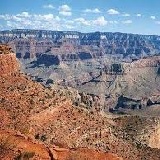 Travel
America - Idaho Travel
America - Idaho
(Beginner -
Reading)
Learn some interesting facts and read interesting
stories about Idaho. |
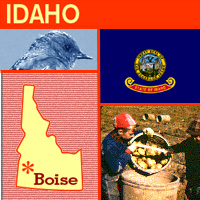 Idaho Idaho
Idaho, the 43rd state, joined the U.S. in 1890. The
state is appropriately shaped like a logger's boot,
and logging as well as mining are big industries in
the state. But the state is probably best known for
its potatoes. The state's name is thought to be an
Indian name, Ee-dah-hoe, which means "gem of the
mountains." Idaho has a rugged landscape with some
of the largest unspoiled natural areas in the
country. Boise is the capital and the state flower
is the syringa. |
Idaho
State Flag
The State Flag of Idaho was adopted in 1907.
The dimensions of the state flag were described specifically
by Idaho legislature: "5' 6" wide, 4' 4" deep, bordered by a
gilt fringe that is 2.5 inches wide. The flag is to be blue
silk with the state seal of Idaho 21" diameter displayed in
the center. Under the great seal, the words "State of Idaho"
are to be embroidered in gold block letters two inches high
on a red band that is 3" wide X 29" length, positioned about
8.5"above and parallel with lower fringe."
The state seal image on the flag is a general
representation, not as detailed as Idaho's official great
seal. Idaho has the only state seal designed by a woman.
Emma Edwards Green designed the original great seal, which
was adopted by the first legislature of Idaho in 1891. Her
painting is held in trust by the Idaho Historical Society -
it is rich with Idaho symbols. |
|
Source:
State Symbols USA |
|
|
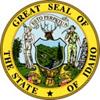 Idaho
State Facts Idaho
State Facts
Picture: state seal of Idaho |
|
State Capital |
Boise |
|
Nickname |
Gem State |
|
Motto |
Esto perpetua (Let it be perpetual) |
|
Statehood |
July 3, 1890 (43th) |
|
Origin of Name |
A derivation of an Indian phrase "E Dah Hoe (How)"
supposedly meaning "gem of the mountains" |
|
Largest Cities |
Boise |
|
Border States |
Montana, Nevada, Oregon, Utah, Washington, Wyoming |
|
Area |
82,751 sq. mi., 11th largest |
|
State Bird |
Mountain Bluebird |
|
State Flower |
Syringa - Mock Orange (philadelphus lewisii) |
|
State Tree |
White Pine (Pinus Monticola pinaceae) |
|
State Song |
Here We Have Idaho |
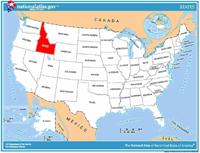 Travel and tourism site
for Idaho - This state travel and territorial tourism
site provides ideas for your vacations, meetings, and more. Travel and tourism site
for Idaho - This state travel and territorial tourism
site provides ideas for your vacations, meetings, and more. |
|
|
Idaho Stories |
|
|
Idaho's Natural Wonders
A gorge is a narrow, steep-walled canyon. And the deepest gorge in
North America is in Idaho. Do you know about it?
Idaho is well known for its natural beauty and rugged landscape. The
state's Sawtooth Mountains are a part of the Rocky Mountains, and
several peaks in these mountains exceed an elevation of 10,000 feet.
Another of Idaho's natural wonders is the Snake River. This river
flows in a great arc and has created extensive valleys throughout
its run.
The Snake River has also made gorges, such as Hell's Canyon, which,
at 7,900 feet, is North America's deepest gorge. Various wildlife
inhabit the rugged landscape of Idaho, including elk, bighorn sheep,
mountain goats, moose, black bear, cougar, and antelope. Smaller
animals include beaver, river otter, red-tailed hawks, and golden
and bald eagles. Do you know how the canyon got its name?
If you guessed that the name refers to the canyon's depth, you were
wrong. The name comes from the fact that a wild journey is in store
for any boat that travels the river! |
|
|
Idaho -- Land of Contrasts
Have you ever heard of a mountain growing right before your eyes?
That's what happened on October, 28, 1983, when Borah Peak, the
highest mountain in Idaho, grew about eight inches higher in two
minutes. Around the same time, the valley floor along 26 miles of
the Lost River Range suddenly lowered 10 feet. Can you guess how
this happened?
It was an earthquake that caused these drastic changes. Idaho is a
state of dramatic geographic contrasts. It is a geologically active
region that includes glaciers, volcanoes and earthquakes, all of
which have produced a spectacular but harsh landscape.
Glaciers move very slowly and grind away at mountains. The Otto
Glacier is the only remaining glacier in Idaho. Only a small remnant
of what it used to be exists on the north slope of Borah Peak. It
and other glaciers have created more than 500 cirques (French for
"circle") in the high mountains of Idaho. A cirque is formed when
glacial erosion removes big blocks of rock from mountains, resulting
in a circle surrounded by mountains. Shallow cirques appear as wet
meadows today, while the deeper ones with bowl-shaped floors may
contain lakes. |
|
Source:
Library of Congress |
|
 National
Forests, Parks, and Monuments of Idaho National
Forests, Parks, and Monuments of Idaho
The following is a description of national
forests, parks, and monuments in the state
of Idaho. If you plan to visit or live in
Idaho for awhile then you should definitely
plan to visit some of these fantastic
places. |
|
|
|
National Forests |
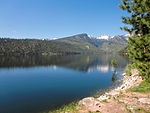 Bitterroot Bitterroot
Bitterroot National Forest is located in the
Bitterroot and Sapphire mountains, reaching
its highest point at 10,157 ft (3,096 m) at
Trapper Peak. The forest is named for the
bitterroot plant. This national forest is
also partially located in the state of
Montana. |
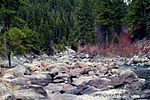 Boise Boise
Portions of the Boise, Payette, and South
and Middle Forks of the Salmon River
drainages make up the forest. There are over
7,600 mi (12,200 km) of streams and more
than 250 lakes and reservoirs in the forest. |
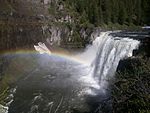 Caribou-Targhee Caribou-Targhee
The forest's Jedediah Smith Wilderness has
many caves and the Winegar Hole Wilderness
protects grizzly bear habitat in the Greater
Yellowstone ecosystem. The Upper and Lower
Mesa Falls are on Henrys Fork of the Snake
River and tours of Minnetonka Cave are
available. This national forest is also
partially located in the state of Wyoming. |
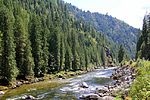 Clearwater Clearwater
The forest covers the Bitterroot Mountains
and Palouse Prairie as well as the
Clearwater and Lochsa rivers. The Lewis and
Clark Expedition followed the Lolo Trail
through the forest in 1805, and gold miners
came to the forest in the 1860s. |
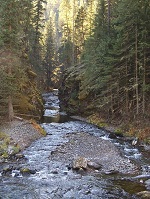 Idaho
Panhandle Idaho
Panhandle
There are two wilderness areas, Cabinet
Mountains and Salmo-Priest, and numerous
recreation opportunities in Idaho Panhandle
National Forest. This forest ranges from the
Canada–US border to the Saint Joe River,
which is the highest navigable river in the
world. This national forest is also
partially located in the states of Montana
and Washington. |
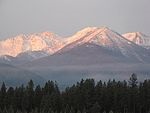 Kootenai Kootenai
Kootenai includes the Cabinet Mountains and
the Kootenai and Clark Fork rivers. The
Noxon and Cabinet Gorge reservoirs are on
the Clark Fork within the forest. The
Northwest Peak Scenic Area is in the Selkirk
Mountains. This national forest is also
partially located in the state of Montana. |
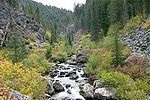 Nez
Perce Nez
Perce
Nez Perce National Forest includes parts of
four wilderness areas: Frank Church-River of
No Return, Gospel Hump, Hells Canyon, and
Selway-Bietterroot. This forest is managed
together with Clearwater National Forest. |
 Payette Payette
Payette National Forest includes the Seven
Devils Mountains and part of the Frank
Church—River of No Return Wilderness. It
also borders Hells Canyon to the west and
contains the Brundage Mountain ski area. |
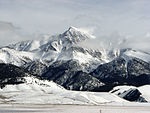 Salmon-Challis Salmon-Challis
Salmon-Challis National Forest includes
parts of both the Salmon River and the Frank
Church—River of No Return Wilderness.
Idaho's highest point, Borah Peak at 12,662
ft (3,859 m), is located in the Lost River
Range in the forest. |
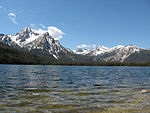 Sawtooth Sawtooth
Sawtooth National Forest includes over 1,100
lakes, 1,000 mi (1,600 km) of trails and
roads, and ten mountain ranges, with the
highest point at 12,009 ft (3,660 m) on
Hyndman Peak. The forest includes Sawtooth
National Recreation Area, the Sawtooth
Range, Sawtooth Wilderness, four ski areas,
and four endemic species, being found
nowhere else in the world. This national
forest is also partially located in the
state of Utah. |
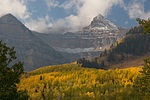 Uinta-Wasatch-Cache Uinta-Wasatch-Cache
There are nine wilderness areas in the
forest, which occupies part of the Wasatch
and Uinta mountains. Mount Nebo and Mount
Timpanogos are located in wilderness areas
at the edge of the Wasatch Front. This
national forest is also partially located in
the states of Utah and Wyoming. |
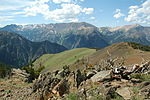 Wallowa-Whitman Wallowa-Whitman
Wallowa-Whitman National Forest stretches
from the Blue Mountains to the Snake River.
Elevations range from 875 ft (267 m) in
Hells Canyon, the deepest gorge in North
America, to 9,845 ft (3,001 m) at the summit
of Sacajawea Peak in the Eagle Cap
Wilderness Area. This national forest is
also partially located in the state of
Oregon. |
|
|
|
National Parks |
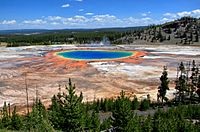 Yellowstone Yellowstone
Situated on the Yellowstone Caldera, the
park has an expansive network of geothermal
areas including boiling mud pots, vividly
colored hot springs such as Grand Prismatic
Spring, and regularly erupting geysers, the
best-known being Old Faithful. The
yellow-hued Grand Canyon of the Yellowstone
River contains several high waterfalls, and
four mountain ranges traverse the park. More
than 60 mammal species including gray
wolves, grizzly bears, black bears, lynxes,
bison, and elk, make this park one of the
best wildlife viewing spots in the country.
This national park is also partially located
in the states of Montana and Wyoming. |
|
|
|
National Monuments |
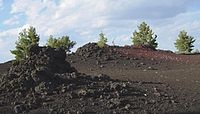 Craters
of the Moon Craters
of the Moon
One of the best preserved flood basalt areas
in the continental U.S. contains three lava
fields along the Great Rift of Idaho as well
as the world's deepest open rift cracks and
other volcanic features. |
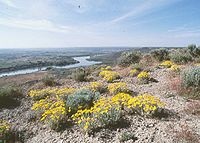 Hagerman
Fossil Beds Hagerman
Fossil Beds
This monument contains the largest
concentration of Hagerman horse fossils in
North America. It protects the world's
richest known fossil deposits from the late
Pliocene epoch, 3.5 million years ago. These
plants and animals represent the last
glimpse of time that existed before the Ice
Age, and the earliest appearances of modern
flora and fauna. |
|
|
|
 Travel
America Travel
America
Do you love America and American English? Learn before
you travel. Facts and other cool stuff about your
favorite U.S. state. Visit the Fun Easy English Travel
America pages. Read about the beautiful National
Forests, Parks, and Monuments. Great English reading practice. |
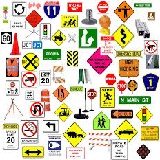 Drive America Drive America
Planning to drive in America? Learn the rules and
regulations. Great English reading practice. |
|